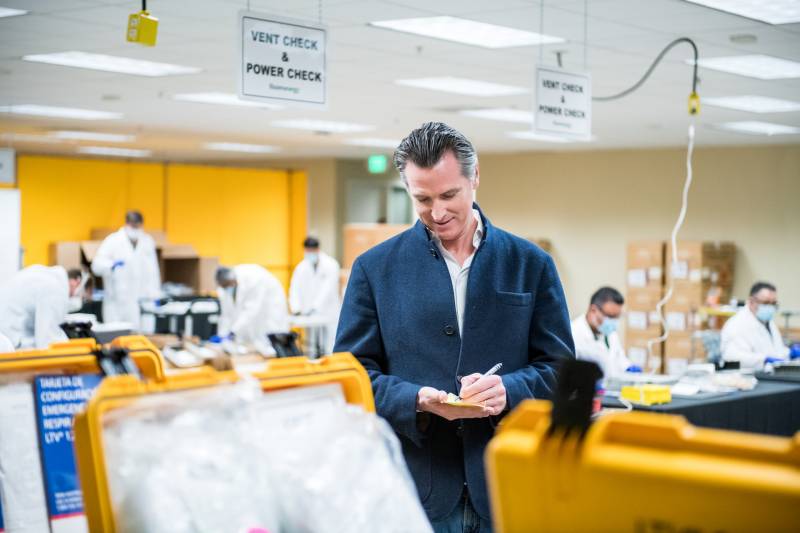Under the act, the president can require businesses to prioritize government contracts above other orders, redistribute supplies to where they are most needed and even direct companies to produce vitally needed goods.
President Trump has been widely criticized for not using the law's full authority in addressing a nationwide shortage of tests and protective equipment. As the coronavirus pandemic worsened and health care workers and epidemiologists pleaded for more masks and testing supplies, Trump told state officials they were responsible for procuring the goods they need.
In California, this led to a rush by the Newsom administration to secure contracts with manufacturers across the globe, while encouraging companies based in the Golden State to pitch in.
In early April, the administration launched a website to request donations and solicit offers for medical supplies.
A handful of companies voluntarily converted their production to meet the state's needs, such as Bloom Energy, a San Jose-based fuel cell generator company that switched to refurbishing ventilators.
But the state largely focused on striking deals with existing suppliers of personal protective equipment, including many outside California. State legislators have pushed the governor for more transparency into some of the larger deals, like the $1 billion purchase of protective masks from a Chinese car company disclosed on May 6.
Other deals for equipment fell apart entirely, including a half-billion dollar payment for medical supplies to a company now under federal investigation, first reported by CalMatters.
"There were some larger contracts that didn’t cost the taxpayers a penny but were cautionary tales," Newsom said when pressed about the deal this week.
Facing this cutthroat marketplace, some governors have longed for the certainty that could come from a state-level Defense Production Act: the potential to strong-arm suppliers within state lines and avoid an international bidding war.
"If I had a Defense Production Act in the state, I would use it," New York Gov. Andrew Cuomo said last month. "I don't have that tool, the federal government does."
The U.S. Constitution gives the federal government the power to regulate the national economy under the Commerce Clause. States have historically been prevented from taking actions that interfere with interstate business by a legal doctrine known as the Dormant Commerce Clause.
However, the idea of a state-level Defense Production Act could pass legal muster. "California or other states could do something very much like the Defense Production Act," said Stanford Law School professor Bernadette Meyler.
"The principal aspects [of the DPA] that have been relevant on the federal level are price controls and trying to make sure that people aren't exploiting the emergency by raising the price of particular needed goods or essential items," Meyler said. "The states could also do the same thing."
Instead of competing in a marketplace against other states and nations all desperate for the same supplies, California would be able to ask suppliers within its borders to place the state at the front of the line for orders, or even require manufacturers to shift their production lines to create swabs, medical glass and masks.
But any attempt by the state Legislature to create these new economic powers would likely face legal challenges from the Trump administration.
Attorney General William Barr has warned states that his office is already on the lookout for any encroachment on the federal government's oversight of the economy.
"We do have a national economy which is the responsibility of the federal government. So it is possible that governors will take measures that impair interstate commerce," Barr said on the Hugh Hewitt Show last month. "And just where that line is drawn, you know, remains to be seen.”
But the Dormant Commerce Clause has not been understood to automatically override a state's interest in protecting public safety, said John Yoo, a law professor at UC Berkeley.
"Just because a state does something that may impact interstate commerce does not mean it's automatically unconstitutional," said Yoo, who worked in the Department of Justice during the George W. Bush administration. "Generally, what the courts have done is to say the state can't pass a law which on its face discriminates against out-of-staters," such as only allowing California residents to participate in a certain industry.

